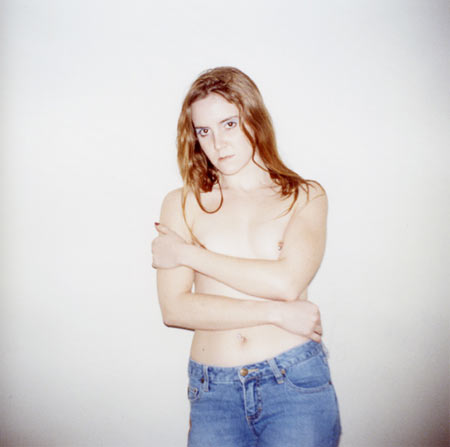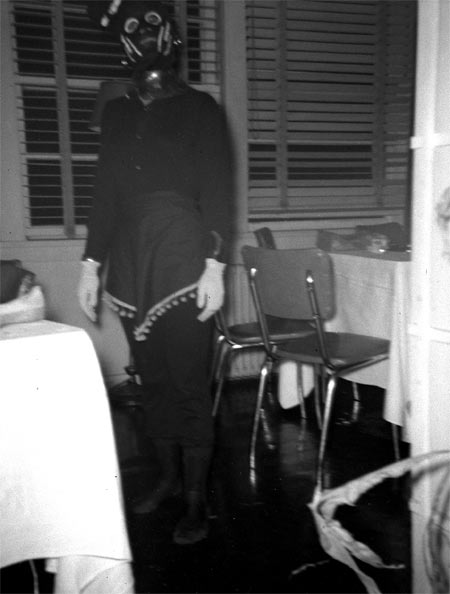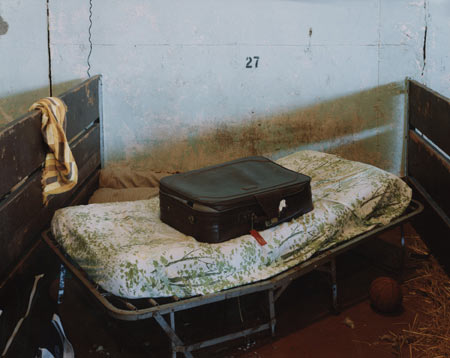A conversation with Paul Schiek
Paul Schiek is the mastermind behind TBW Books. You might not have heard of TBW Books - but I think you might really appreciate what Paul does with it: “Four accomplished artists working in the photographic medium were invited to present an intensely personal and poetic exploration of their work to be released in the form of a book. Each artist will be represented by one book in this four book series. Given complete creative control, these gifted individuals crafted powerful, surprising, and completely uncompromised works that implore the viewer to contemplate the relationships between images. […] The Subscription Series is a limited edition, hand numbered book series that will not be available in stores. Subscribers will receive one book every three months beginning December 1st [2008]. Book quantities are limited to 650 unsigned subscriptions and 50 signed subscriptions.” I talked to Paul about the ideas behind all of this.

(Todd Hido)
Jörg Colberg: How did you come up with the idea of producing a subscription series of photo books?
Paul Schiek: It was just a logical way for me to show my photos, in a contained form that could travel. I felt like it was the best vehicle for my work, so naturally I thought of others that I wanted to show, too, and it just grew from there. I tried dealing with retail spaces, and it was really a bad experience; so out of necessity I just developed my own way of distributing them. I knew people would only buy some books and not others, so the subscription assures that they will get all the books and be exposed to books they might not otherwise purchase.
JC: With the art book market dominated by extremely high-end books - with a price tag matching production quality - offering four books for what usually would get you a single book is an interesting deviation from the norm. It does make one wonder a little why you are not charging more for the books - as you could easily do, especially when you look at how small editions of photography books typically are even more expensive than regular photo books.
PS: It would kill me to know that there is some kid out there searching for something real, and stumble across these books and have them priced so crazy they couldn’t afford them. That would sort of crush me… I was and still am that kid. I always wanted to make records, but I’m not a musician, so instead I started making these books and, really, I just treat them like I would [treat] a record. I basically run a record label that doesn’t sell music. I try to hand number each book, and the covers are always hand stamped. I try to make them sort of special in that way. It’s sort of conflicting for me because I’m trying to make them into art objects. They don’t have ISBN numbers, and so some people tend to think they aren’t real books; and to charge real book prices would make me some sort of grub. But if you look at them as being more special than a book in a Barnes and Noble, if you look at them as objects, then the price is way too low. It’s a fine line that the books walk.

(Marianne Mueller)
JC: So this all is really bringing the idea of small record labels into the photography book world. Which begs the question who the people are who buy them - do you get a similar crowd, the kind of very dedicated people who would normally hang out in record stores and talk about rare 7” instead and of how downloading music is really just killing the fun?
PS: It’s weird because I am am pretty much that guy many days. And I really hate that guy. “Oh, man, remember when music was good….?” Music has always been good and bad. Just like photography and film and every art form. There is always going to be someone that hates something and makes another art in response. I think this digital age is great. I could not do what I do with out it. I think what’s important however is knowing the past, predicting the future and trying to make something that acknowledges both in the now. I don’t think digital downloads killed music. But it did birth tons of mediocrity and out of that mediocrity grew .00001 ounce of dissent and in that dissent something beautiful can emerge, just as it always has with everything. Then that dissent eventually becomes normalized and boring and something new and unpredictable will replace it. It’s great! And now it’s happening so fast! Here today, gone tonight as they say.
I have found my audience with these books are people who have an appreciation for good art and something that feels special. By special I mean a human being has been involved in the process visibly. It may be as simple as a hand written note in their order. I find people really like
getting things in the mail. And I think the digital age has people longing for the tangibility of these books. You feel the pages, smell the ink, it’s five minutes out of your day that’s not a computer screen. These books are vinyl, not mp3.
JC: How did you approach the photographers whose work is being published in this way? And what reactions did you run into when you suggested this style of book?
PS: Up to this point I have only worked with people I have known. And so they were really trusting of what I am up to, I think, because they know me and my way of working. The only people I didn’t know so far were Alec Soth and Marianne Mueller. Todd Hido had introduced me to them. They both were so open to the idea of these books. I really have such a tremendous respect for them because of that. These are both really respected and established artists taking a risks by working with someone whom they didn’t know. I don’t know that I would be comfortable doing that, so for that I am really grateful.

(Abner Nolan)
JC: OK, record label question: What if Steidl or any other big publisher offered you a whole ton of money and creative freedom - would you accept it and produce books for them, instead of doing it your way? Would you “sell out”? Thurston Moore or Steve Albini?
PS: I think I would have to see where I am at in my own projects and see what it needs. I read probably once a month an interview from Self Service magazine with Gerhart Steidl. I read it because it is super inspirational to me. I think he is incredible. Complete creative control is the goal, right. That’s why I made my own publishing company. I think the bottom line for me is that I come from a place that says if you don’t have resources and you want resources you better figure out a way to get some. If Steidl had resources that I wasn’t able to provide for myself and he wanted to give me those resources I could see myself doing that. But I have always felt that I don’t want to wait around and hope people like what I do. I don’t have that sort of time. I’d rather just being trudging forward on my own. Thurston Moore or Steve Albini? I’m from the the Midwest, so it’s no question, Albini.
JC: In general, for you personally what is the appeal of a photography book? What is it that you like to see in a book?
PS: I think I am just attracted to the containment of books. I’m big into containment and compartmentalizing. I like that I can sum up portions of my life in a book. It’s a clear and concise statement presented to anyone who cares to have a look about where my head was at at that time in my life. Also, they live long ofter a show comes down. They are really intimate and physical. I love that you can destroy them. I love looking so hard at a book [that] I destroy it. They have a physicality that prints or paintings lack.

(Alec Soth)
JC: And of course, I have to ask this: Can you name me a few of your favourite photo books?
PS: Wisconsin Death Trip and all of Ari Marcopoulos books. He has a fantastic approach to bookmaking. He makes books like rappers make mix tapes. I think its a great reaction in photography to what we talked about before. The pace at which we consume information. Any books people I know make or if people give me or trade me a book of theirs. I think that’s pretty much the best. I don’t really have many books. Mostly just records, which I think of as books. The only book I have ever read is “Letters to a Young Poet” by Rilke. I have that book and a book called “The Transported” that knocked me out that someone I love gave me, and a book called “RFK Funeral Train”. That book brought me to tears.
 By
By